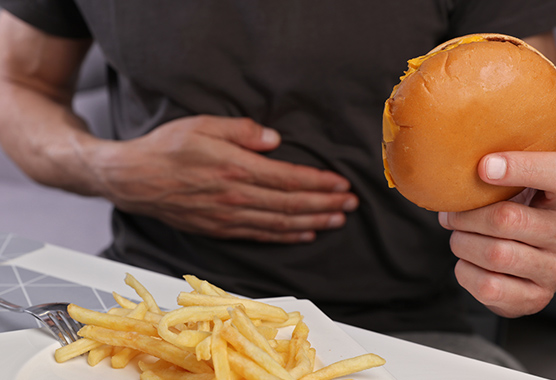Salmonella Infection
Our specialists diagnose and treat Salmonella infections. We provide leading-edge care for even the most severe cases.
Medically reviewed by Dean Blumberg, M.D. on Nov. 08, 2023.

What Is a Salmonella Infection?
Salmonella are bacteria that can cause salmonellosis, an illness that can make you sick. You can get a Salmonella infection through contaminated food, water or animals.
These bacteria are the leading cause of food poisoning and most commonly affect raw or undercooked chicken. You can also get a Salmonella infection through pork, beef, eggs, fruits, vegetables and packaged foods like nut butters or frozen meals.
UC Davis Health Division of Infectious Diseases specialists and primary care providers care for this common infection. We are ready to treat even the most severe cases with our team of compassionate experts.
Symptoms of Salmonella Infection
Symptoms of a Salmonella infection usually appear within a few hours of exposure to the germ. Most people are sick for two to seven days.
Common Symptoms
Most Salmonella infections are not severe but can make you feel sick for several days. If you have a mild infection, you may have:
- Abdominal (stomach) pain
- Diarrhea
- Fever
- Nausea
Emergency Symptoms
Some Salmonella infections can be severe, causing life-threatening dehydration. The bacteria can spread to your blood, bone or nervous system. Seek emergency care if you experience:
- Blood in your urine or stool
- Diarrhea for more than three days
- Dizziness
- Extreme thirst
- High fever (above 102 degrees Fahrenheit)
- Urinating very little or dark urine
- Very dry mouth, eyes and throat
- Vomiting (unable to keep fluids down)
Causes of Salmonella Infection
You can get a Salmonella infection after eating or touching:
Contaminated Food
Salmonella can contaminate eggs, beef, pork, and poultry. You can also get the germ from fruits, vegetables, sprouts and packaged foods, but this is less common.
Animals
Many farm animals and pets, including backyard chickens, reptiles and small turtles, can carry Salmonella in their feces (stool). You could ingest the bacteria if you touch something with even a tiny amount of animal feces and then touch your mouth.
Human Feces
If a person has Salmonella in their stool, the germs can get on the person’s hands, clothing or other items. Then, others can pick up the bacteria from touching those items.
Risk Factors
Risk Factors for Salmonella Infection
Some people are more likely to have a life-threatening Salmonella infection, including:
Existing Health Conditions
If you have cancer, diabetes, heart disease, spleen problems, or another condition, your immune system may not be as strong as someone without these conditions.
Children or Older Adults
Children under age 5 and adults over age 65 have a higher risk of a severe Salmonella infection.
Travel
Travel to some areas of the world can result in increased risk of some forms of Salmonella.
Diagnosing Salmonella Infections
Our team has decades of experience diagnosing and treating bacterial infections like Salmonella. First, we evaluate your symptoms and listen to your concerns. Then, we ask you about your health history, travel history, exposure to animals, and the foods and drinks you consumed recently.
To confirm a Salmonella infection diagnosis, we run one or more laboratory tests to check for the bacteria. You may need a blood test or a stool sample. You receive a quick, accurate diagnosis, and we explain your results.
Salmonella Infection Treatments
Mild cases of Salmonella infection may only require rest and fluids. If you have a severe infection, you may need:
Antibiotics
Certain antibiotics kill Salmonella bacteria and help your body clear the infection. Our specialists prescribe a medication that’s safe and effective for you.
Hospitalization
People who are very ill may need hospital care to recover. Our team provides IV fluids, anti-nausea medications and compassionate care in our comfortable, modern patient rooms.
Preventing Salmonella Infection
You can avoid most Salmonella infections if you follow these steps:
Clean
Thoroughly wash your hands and surfaces before and after handling food, especially raw or undercooked eggs, poultry and meats.
Separate
Keep raw eggs, meat and poultry away from other foods. Use separate dishes and utensils for these foods and wash them immediately after use.
Cook
Thoroughly cook meats and eggs before eating to kill Salmonella bacteria.
Chill
Put leftover food in the refrigerator right away. Don’t leave perishable foods out at room temperature for more than two hours.
Get Vaccinated
Immunization for one form of Salmonella may be recommended for travel to areas at increased risk.
Each year
450People die from Salmonella infection in the U.S.
Salmonella causes
1.35MInfections in the U.S. each year
Sources: Food and Drug Administration: Salmonella (Salmonellosis)
Centers for Disease Control and Prevention (CDC): Salmonella
Request an Appointment
As Sacramento's No. 1 hospital, you'll benefit from unique advantages in primary care and specialty care. This includes prevention, diagnosis and treatment options from experts in 150 specialties.
Referring Physicians
To refer a patient, submit an electronic referral form or call.
800-4-UCDAVIS
Patients
Call to make an appointment.
Consumer Resource Center
800-2-UCDAVIS

Ranked among the nation’s best hospitals
A U.S. News & World Report best hospital in cardiology, heart & vascular surgery, diabetes & endocrinology, ENT, geriatrics, neurology & neurosurgery, and pulmonology & lung surgery.

Ranked among the nation’s best children’s hospitals
U.S. News & World Report ranked UC Davis Children’s Hospital among the best in pediatric nephrology, orthopedics*, and pulmonology & lung surgery. (*Together with Shriners Children’s Northern California)

Ranked Sacramento’s #1 hospital
Ranked Sacramento’s #1 hospital by U.S. News, and high-performing in aortic valve surgery, back surgery (spinal fusion), COPD, colon cancer surgery, diabetes, gynecological cancer surgery, heart arrhythmia, heart failure, kidney failure, leukemia, lymphoma & myeloma, lung cancer surgery, pacemaker implantation, pneumonia, prostate cancer surgery, stroke, TAVR, cancer, orthopedics, gastroenterology & GI surgery, and urology.

The nation’s highest nursing honor
UC Davis Medical Center has received Magnet® recognition, the nation’s highest honor for nursing excellence.

World-class cancer care
One of ~59 U.S. cancer centers designated “comprehensive” by the National Cancer Institute.

A leader in health care equality
For the 13th consecutive year, UC Davis Medical Center has been recognized as an LGBTQ+ Healthcare Equality Leader by the educational arm of America’s largest civil rights organization.

